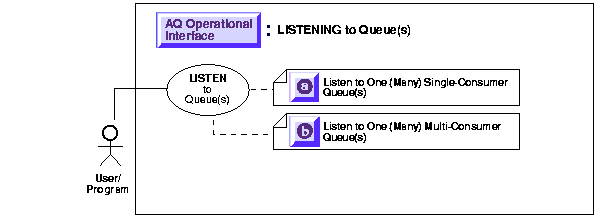Release 1 (9.0.1)
Part Number A88890-02
Home |
Book List |
Contents |
Index | Master Index | Feedback |
| Oracle9i Application Developer's Guide - Advanced Queuing Release 1 (9.0.1) Part Number A88890-02 |
|
Operational Interface: Basic Operations, 8 of 19

To monitor one or more queues on behalf of a list of agents.
The call takes a list of agents as an argument. You specify the queue to be monitored in the address field of each agent listed. You also must specify the name of the agent when monitoring multiconsumer queues. For single-consumer queues, an agent name must not be specified. Only local queues are supported as addresses. Protocol is reserved for future use.
This is a blocking call that returns when there is a message ready for consumption for an agent in the list. If there are messages for more than one agent, only the first agent listed is returned. If there are no messages found when the wait time expires, an error is raised.
A successful return from the listen call is only an indication that there is a message for one of the listed agents in one the specified queues. The interested agent must still dequeue the relevant message.
Note that you cannot call listen on nonpersistent queues.
See Chapter 3, "AQ Programmatic Environments" for a list of available functions in each programmatic environment. Use the following syntax references for each programmatic environment:
See Chapter 3, "AQ Programmatic Environments" for a list of available functions in each programmatic environment. Examples in the following programmatic environments are provided:
|
|
 Copyright © 1996-2001, Oracle Corporation. All Rights Reserved. |
|